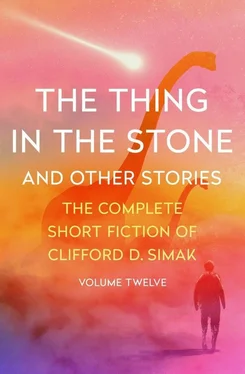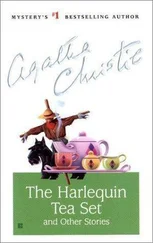Looking down at the laboratory, I could see some strange mechanism mounted on the roof of the building. Beside the massive mechanism stood the Creator.
“Maybe it’s a weapon of some sort,” suggested Scott.
Hardly had he spoken when a huge column of crimson light leaped forth from the machine. I threw up my hands before my eyes to protect them from the glare of the fiery column. For an instant the globe was bathed in the red glow, then a huge globule of red collected on its surface and leaped away, straight for the laboratory, leaving a trail of crimson behind.
The globe trembled to the force of the explosion as the ball of light struck. Where the laboratory had stood yawned a great hole, blasted to the primal rock beneath. The vegetation for great distances on every side was sifting ash. The Creator was no more! The colorful world beneath stretched empty to the horizon. The men of the universe had proven to be stronger than their Creator!
“If there’s any more Creators around these parts,” said Scott, smiling feebly, “they won’t dare to train another gun on this thing in the next million years. It gives them exactly what was meant for the other fellow; it crams their poison right down their own throats. Pete, that mass of matter, whether or not it is the universe, is saved. All hell couldn’t get at it here.”
The walking-stick-man, his mummy-like face impassive as ever, locked the controls of the machine. It was, I saw, still operating, was still building up the shell of the globe. Second by second the globe was adding to its fortress - light strength. My mind reeled as I thought of it continuing thus throughout eternity.
The elephant-men were climbing into their machine.
Scott smiled wanly.
“The play is over,” he said. “The curtain is down. It’s time for us to go.”
He stepped to the side of the walking-stick-man.
“I wish you would use our machine.” he said, evidently forgetting our friend could understand no word he spoke. “You threw away your chance back there when you built this contraption instead of a transmitter. Our machine will take you wherever you wish to go.”
He pointed to the machine and to the universe, then tapped his head. With the strange being at his side, he walked to our machine, pointed out the controls, explained its use in pantomime.
“I don’t know if he understands,” said Scott, “but I did the best I could.”
As I walked past the walking-stick-man to step into the time-power machine, I believe I detected a faint flicker of a smile on his face. Of that, however, I can never be sure.
CHAPTER SIX
Marooned in Time
I know how the mistake was made. I was excited when I stepped into the machine. My mind was filled with the many strange happenings I had just witnessed. I thought along space directional lines, but I forgot to reckon the factor of time.
I thought of the Earth, but I did not consider time. I willed myself to be back on Earth, but I forgot to will myself in any particular time era. Consequently when Scott shoved over the lever, I was shot to Earth, but the time element was confused.
I realize that life in the super-universe of the Creator, being billions of times larger than life upon the Earth, was correspondingly slower. Every second in the super-universe was equal to years of Earth-time. My life in the Creator’s universe had equaled millions of years of terrene existence.
I believe that my body was projected along a straight line and not along the curve which would have been necessary to place me back in the twentieth century.
This is theory, of course. There might have been some fault in the machine. The purple globe might have exerted some influence to distort our calculations.
Be that as it may, I reached a dying planet. It has been given to me, a man of the twentieth century, to live out the last years of my life on my home planet some millions of years later than the date of my birth. I, a resident of a comparatively young dynasty in the history of the Earth, now am tribal chieftain and demi-god of the last race, a race that is dying even as the planet is dying.
As I sit before my cave or huddle with the rest of my clan around a feeble fire, I often wonder if Scott Marston was returned to Earth in his proper time. Or is he, too, a castaway in some strange time? Does he still live? Did he ever reach the Earth? I often feel that he may even now be searching through the vast corridors of time and the deserts of space for me, his one-time partner in the wildest venture ever attempted by man.
And often, too, I wonder if the walking-stick-man used our time-power machine to return to his native planet. Or is he a prisoner in his own trap, caught within the scope of the great purple globe? And I wonder how large the globe has grown to be.
I realize now that our effort to save the universe was unnecessary so far as the Earth was concerned, for the Earth, moving at its greater time-speed, would already have plunged into extinction in the flaming furnace of the sun before the Creator could have carried out his destructive plans.
But what of those other worlds? What of those other planets which must surely swim around strange suns in the gulf of space? What of the planets and races yet unborn? What of the populations that may exist on the solar systems of island universes far removed from our own?
They are saved, saved for all time; for the purple globe will guard the handiwork of the Creator through eternity.
This story was originally published in the March 1956 issue of Science Fiction Stories , and I believe it’s the same one that Clifford D. Simak wrote in late 1953 and early 1954, using the title “Grail,” which was rejected by several magazines before editor Robert A. W. Lowndes purchased it in June 1955. Although there is no record as to when Cliff’s title was changed, or who made that change, the timing is right—and so is the subject matter of the story, for this is a story about a religious quest.
Cliff Simak’s writings touched on the subjects of religion and faith quite often. This may be the most enigmatic of those references, and the least caustic of Cliff’s comments on religion.
—dww
The planet was so unimportant and so far out toward the rim that it didn’t have a name, but just a code and number as a key to its position. The village had a name, but one that was impossible for a human to pronounce correctly.
It cost a lot to get there. Well, not to get there, exactly, for all one did was polt there; but it cost a hunk of cash to have the co-ordinates set up for the polting. Because the planet was so far away, the computer had to do a top-notch job, correct to seven decimal points. Otherwise one took the chance of materializing a million miles off destination, in the depths of space; or if you hit the planet, a thousand or so miles up; or worse yet, a couple hundred underneath the surface. Any one of which would be highly inconvenient, if not positively fatal.
There was no reason in the universe for anyone to go there—except Anson Lathrop. Lathrop had to go there because it was the place where Reuben Clay had died.
So he paid out a pocketful of cash to get himself indoctrinated to the planet’s mores and speech, and a bucketful of cash to get his polting plotted—a two-way job, to get both there and back.
He arrived there just about midday, not at the village exactly, for even seven decimal points weren’t good enough to land him squarely in it—but not more than twenty miles away, as it turned out, and no more than twelve feet off the ground.
He picked himself up and dusted himself off and was thankful for the knapsack that he wore, for he had landed on it and been cushioned from the fall.
Читать дальше












